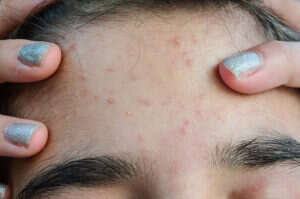Isotretinoin (Formerly Accutane®)

Isotretinoin (formerly Accutane®) is often referred to as a “last resort” drug for those who suffer from severe acne. It is also effective in treating painful acne cysts.
Isotretinoin is available in various brand names, including Absorica, Amnesteem, Claravis, Myorisan, and Sotret. The original brand, Accutane, is no longer on the market.
When other treatment options, such as oral antibiotics or Isolaz Laser or Photodynamic Therapy, do not work, Isotretinoin helps to diminish or clear severe acne and prevent new acne scars.
How Isotretinoin Works
Isotretinoin is part of a category of medication called retinoids, which are similar to vitamin A. Isotretinoin, like other retinoids, works by reducing the oil production from the sebaceous glands. Usually, people who have trouble with acne produce more sebum than necessary. Since Isotretinoin helps shrink the oil glands, a smaller amount of sebum is produced, and your pores no longer get clogged. This helps keep your skin clear of acne.
Additionally, Isotretinoin regulates the skin cells in the hair follicles, reduces skin inflammation, and decreases the amount of bacteria on the skin. All of these factors combined help reduce the occurrence of acne on your skin.
How Soon Can You See Results With Isotretinoin
Isotretinoin medication is typically taken for 6 months. It is a pill taken once or twice daily with food. Some patients notice improvement immediately, while others may notice their acne getting worse before it gets better. Most patients see an improvement in their acne by the third or fourth month of treatment. In most cases, patients do very well after taking a full course, with about 95 percent responding very well.
Isotretinoin is usually prescribed as a weight-based medication, meaning a course of Isotretinoin is complete once the patient has taken a certain amount of medication per pound of weight. It is, therefore, important that patients not take more than what is prescribed for them.
Usually, patients who complete the appropriate dosage do very well. Unfortunately, there is still a very small percentage (about 5 percent) of patients who do not respond to treatment after taking Isotretinoin. Of the 5 percent of patients who do not see improvement, 50 percent are likely to experience clear skin after the second course of medication.
Side Effects of Isotretinoin
While a vast majority of patients do not experience any major side effects with Isotretinoin, others may experience side effects, such as:
Excessive Dryness of The Skin and Lips. This is the most common side effect. We recommend that patients regularly use moisturizers and emollients on the lips and body to address dryness. Vaseline works very well for this. Patients may also experience dry nasal passages, leading to nose bleeds.
Gastrointestinal Issues and Mood Changes. While these conditions are rare, they can be potentially serious, so it is essential to contact your doctor immediately if you feel you are experiencing them.
Liver Complications. Ideally, alcohol should be avoided or minimized while taking Isotretinoin because a possible side effect includes liver complications. Since alcohol is known to potentially damage the liver, the combination of alcohol and Isotretinoin could be harmful.
Cholesterol (triglyceride) increase. Cholesterol levels are often checked at baseline before starting isotretinoin and at least once after being on the medication to ensure levels are not significantly increased. A healthy diet is encouraged while on isotretinoin.
Initial Acne Flare-Up. If you experience an initial acne flare-up, your doctor will have you decrease your dosage and then gradually increase it.
Sensitivity to Sunlight. Isotretinoin can make your skin more sensitive to the sun. Therefore, regular sun protection and avoidance of excess direct sunlight are recommended.
Long-Term Side Effects of Isotretinoin
Long-term side effects of Isotretinoin have been widely talked about in the media. One of these much talked about side effects is a link to birth defects. As a preventative measure, patients who are capable of being pregnant should wait at least one month after finishing a course of Isotretinoin before trying to conceive. These patients should also take a pregnancy test each month before starting the next prescription. All patients are required to register/comply with the federal IPLEDGE program before starting isotretinoin and each month while taking the medication.
How Long Results Last With Isotretinoin
For some patients, Isotretinoin is a “cure,” meaning they never have acne again. They might still get the occasional pimple, but they don’t get severe breakouts as they did before treatment. Other patients might experience clear skin for many years after treatment but then have flare-ups at some point in the future. The good news is that after taking Isotretinoin, most patients respond better to conventional acne medications and do not need to restart the drug.
Isotretinoin Treatment Near You in NY, NJ, PA, CT, FL, IL, MN and MO
Many patients suffer from acne for years before seeing a board-certified dermatologist. Neglecting your skin is one of the worst ways to approach acne. Whether you have a mild case or severe cystic acne, it is best to consult a qualified and experienced dermatologist to help you. Isotretinoin treatment may be right for you.
For appointments, call Schweiger Dermatology Group at (844) DERM-DOC.
To find a location near you, check out our location pages. We look forward to working together to find the best treatment for your skin!
